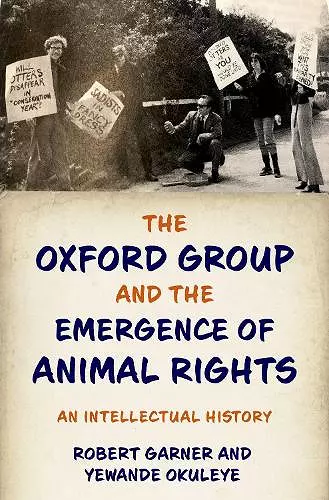The Oxford Group and the Emergence of Animal Rights
An Intellectual History
Robert Garner author Yewande Okuleye author
Format:Hardback
Publisher:Oxford University Press Inc
Published:10th Dec '20
Currently unavailable, and unfortunately no date known when it will be back

Animal rights is now a concept that has achieved wide name-recognition. Vegetarianism, and even veganism, is now commonplace, representing a massive transformation in public attitudes. Fifty years ago, the concept of animal rights was almost unheard of and the animal protection movement lay dormant. Even vegetarians were regarded as, at best, cranks and, at worst, dangerous critics of the social order. Yet the late 1960s and early 1970s were a formative time for the contemporary animal rights movement. One of the most important and influential intellectual moments for animal rights occurred at this time at Oxford University among like-minded scholars who would become known as the Oxford Group. The Oxford Group and the Emergence of Animal Rights is about this little known group--a loose friendship group of primarily postgraduate philosophy students who attended the University of Oxford for a short period of time in the late 1960s. The book traces the early development of the Oxford Group and its influence on animal rights theory and activism. It also serves as a case study of how the emergence of important work and the development of new ideas can be explained, as well as how the intellectual development of participants in a friendship group is influenced by their participation in a creative community. For example, would Peter Singer have written his landmark book Animal Liberation--or anything about animal ethics--without being exposed to the other members of the Oxford Group? How would the discipline of animal ethics differ if the group had not produced their edited collection of articles, Animals, Men and Morals? Drawing on previously unpublished correspondence among and interviews with the surviving Oxford Group members, Robert Garner and Yewande Okuleye explore the social and political milieu in which the group formed to understand how such intellectual movements coalesce.
This is first-class research: readable, informative, and an important contribution to the sociology of creativity. I was particularly impressed by the detailed analysis of the state of philosophy at Oxford when the group formed, and the close attention to the interaction of the members of the circle that led to their revolutionary thinking that went beyond the conventions of the field. The authors convincingly argue that, for circles that develop in a magnet place at the center of discipline, it is important to take into account the roles that mentors as well as peers play in the shaping the shared vision of the circle. Their use of oral history to reconstruct the interaction in the circle is an important contribution to the methodology for studying collaborative circles. * Michael Farrell, University at Buffalo, The State University of New York *
Part intellectual history and part philosophical biography, this clear and accessible book is original in charting the intellectual development of the philosophy of animal rights. Garner and Okuleye trace the origins of key concepts such as speciesism and equal consideration to a group of friends and colleagues who, history has shown, were independent thinkers way ahead of their time. Not only devotees of animal rights, but also anyone curious about the personal life of Peter Singer, and the history of analytic philosophy in Oxford in the late 60s and early 70s, will enjoy The Oxford Group and the Emergence of Animal Rights. * John Hadley, Western Sydney University *
This book is a wonderful read. It is both academically insightful and a well-written account of a fascinating time, and fascinating people. It offers a detailed analysis of individuals and events that have proven important to the advent of both Animal Studies as an academic sub-discipline and the animal protection movement. In particular, the book affirms all the time and energy I--and many others--invest in bringing like-minded people together. Is event organizing worthwhile? This book suggests that yes, it absolutely is. * Siobhan O'Sullivan, University of New South Wales *
Garner and Okuleye's outstanding study of the Oxford Group reveals the provenance of animal ethics in the academy and the emergence of animal activism in the streets. This is a must-read for scholars, activists, and anyone who cares about our relationship with the natural world * Kim Stallwood, author of Growl: Life Lessons, Hard Truths, and Bold Strategies from an Animal Advocate *
ISBN: 9780197508497
Dimensions: 152mm x 236mm x 20mm
Weight: 476g
202 pages